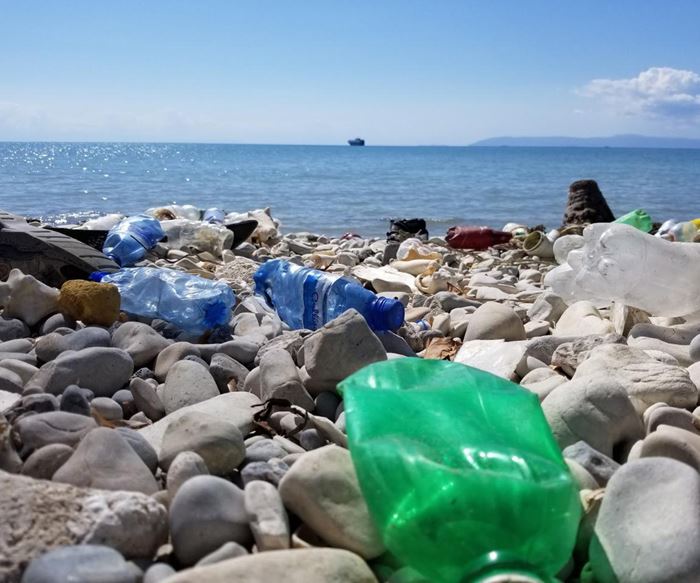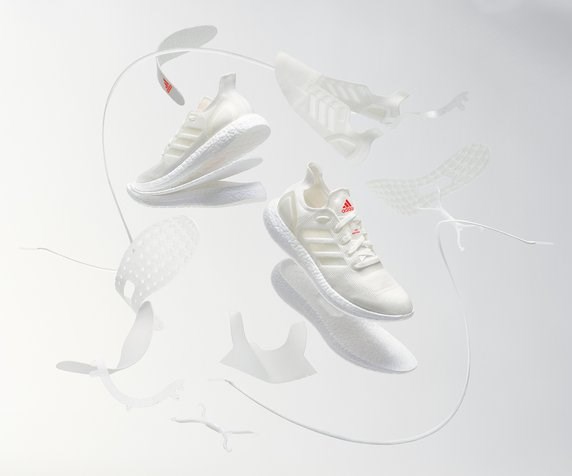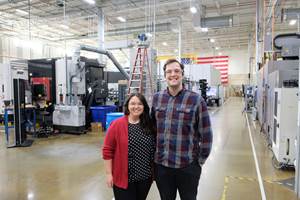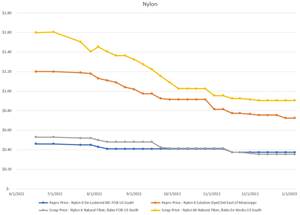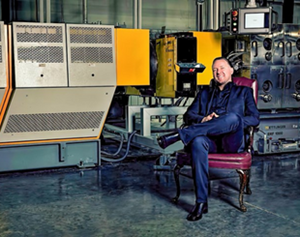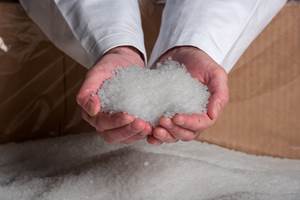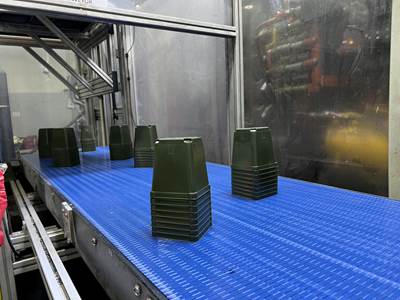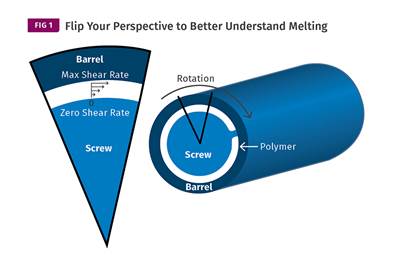Earth Day 2019: Reinventing Reuse with Ocean-Bound Plastics Initiatives
A look at new products and initiatives to help curb ocean-bound plastics, including HP, adidas and Dow.
This year’s Earth Day theme centers around the Protect our Species campaign, which aims to bring awareness of the growing threats to endangered species, with six of the 14 most endangered species living in the ocean.
We know that keeping plastic out of the ocean is critical to protect marine life. And last year, I reported on several key initiatives involving turning ocean-bound plastic into viable products. Let’s take a look at new projects and announcements in that area.
In celebration of Earth Day 2019, HP announces major milestones
HP announced a $2 million investment to expand its ocean-bound plastic supply chain (read more about the supply chain here). The company will build a new plastic washing line in Haiti that will allow it to produce cleaner, higher quality recycled plastic locally for use in HP products. The new washing line will help enable Haiti to expand its recycling capabilities and compete better on the international plastics market. HP suppliers Lavergne and ECSSA have partnered with HP on the project since efforts began in 2016.
HP aligned with ocean-bound plastics leader NextWave Plastics in October 2018 to join similarly focused companies dedicated to integrating ocean-bound plastics into their product supply chains. The coalition has set a goal to divert a minimum of 25,000 tonnes of plastics, the equivalent to 1.2 billion single-use plastic water bottles, from entering the ocean by the end of the year 2025.
HP has been actively reducing ocean-bound plastic in Haiti since 2016, when the company began partnering with the First Mile Coalition to convert plastic bottles into recycled material used in Original HP ink cartridges. These efforts have already diverted approximately 716,000 pounds of plastic materials—or more than 25 million bottles—preventing this plastic from reaching the waterways and oceans and repurposing it into HP cartridges.
Globally, HP has converted more than 199 million pounds of recycled plastic into 3.9 billion HP Original ink and toner cartridges since 2000.
HP’s ocean-bound plastic programs are also creating new opportunities for economic advancement and education in local communities. In Haiti, HP’s partnership with Thread International and Work has helped create more than 795 income opportunities for adults in the country and opened two new learning centers equipped with HP ProBook x360 Education Edition laptops and HP printers. The collaboration has already provided 100 children with quality education, food, and medical assistance and the new investment will create more than 1,000 new income opportunities.
“Our investments and partnerships in Haiti are a great example of the positive change that can happen when businesses and NGOs come together to support shared objectives,” says Ellen Jackowski, global head of sustainability strategy and innovation, HP. “We are keeping millions of plastic bottles from ever reaching our oceans, converting them into sustainable products, and creating new opportunities for local residents through job creation and education.”
The company also unveiled a new study underscoring the importance of sustainable business practices in recruiting, hiring and retaining top talent. It also finds that employees are more productive, motivated and engaged when working for an employer who is leading the charge in social responsibility. The global, 20,000 participant survey found that 61 percent believe sustainability is mandatory for businesses. Of those interviewed, 56 percent believe that ignoring environmental impact in the workplace is as bad as ignoring diversity and inclusion.
100% recyclable shoe
Together with Parley for the Oceans, adidas introduced in 2015 the first footwear concept with an upper made entirely of yarns and filaments reclaimed and recycled from marine plastic waste and illegal deep-sea gillnets. In 2019, adidas will produce 11 million pairs of shoes containing recycled ocean plastic through intercepting plastic waste on beaches, remote islands and in coastal communities.
Now the company takes it one step further with the launch of futurecraft.loop, a 100% recyclable performance running shoe. It can be returned to adidas, broken down and reused to create new performance running shoes.
adidas is committed to using only recycled polyester in every product and on every application where a solution exists by 2024. Creating products with premium materials by Parley, made from up-cycled marine plastic waste, is the first pillar of adidas’ sustainability strategy.
Sports footwear typically include complex material mixes and component gluing, resulting in a shoe which can only be downcycled. After close to a decade of research and development alongside leading material development, manufacturing and recycling partners across Asia, Europe and North America, adidas has found a way to change the process.
Futurecraft.loop uses one material type and no glue. Each component is made from 100% reusable TPU - it’s spun to yarn, knitted, molded and clean-fused to a midsole.
Once the shoes come to the end of their first life and are returned to adidas, they are washed, ground to pellets and melted into material for components for a new pair of shoes.
Tanyaradzwa Sahanga, manager, technology innovation at adidas, commented:
“We set out to create a new type of product that we can take back, grind up and reapply into new adidas product. We knew this was a far-reaching vision in every way; technically and even behaviorally. There were times when it didn’t seem like we could get over some of the technical hurdles—now we’ve made the first leap, the playing field has changed. We cannot create a circular future on our own, we are going to need each other. We’re excited to see this first step come to life as part of the beta launch.”
The first-gen futurecraft.loop shoe is rolling out as part of a global beta program with 200 users. adidas will challenge them to run, return the shoes and share feedback on their experience, ahead of the second-gen drop.
The insights will be used to shape the roadmap for the wider release targeted for spring or summer 2021.
Dow Projects
During The Packaging Conference in February, Jennifer Ronk, sustainability and advocacy manager, North America, Dow Packaging and Specialty Plastics, discussed how the entire value chain needs to work together to improve how we manage plastics at the end of life.
Ahead of Earth Day, Dow discussed three ways that the company is working to find solutions and move people and industry into a zero waste plastics circular economy:
- Cleaning up our oceans: Last year, Dow launched its inaugural annual #PullingOurWeight clean-up campaign, where more than 5,600 Dow employees, along with family and friends, collected more than 51,000 lb of trash in 55 different locations around the world. Dow’s 2019 goal is to collect more than 100,000 lb of trash at more than 100 sites around the world
- Improving waste management and advancing the circular economy: Dow is focused on advancing the circular economy by finding ways to reuse plastic as well as make it easier for consumers to recycle. For example, their HeftyEnergyBag program, which allows consumers to discard hard-to-recycle plastics. Additionally, Dow constructed more than 90 kilometers of asphalt roads containing plastic across the US, India, Indonesia and Thailand, and the company is always looking for ways to build on the success of these initiatives. As an example, Dow just signed an agreement with a Vietnamese industrial park developer, Deep C, to build a recycled plastic road in Haiphong City. “Our hope is to create a streamlined, consistent and economically viable process for developing plastic-enhanced asphalt that can be applied in communities around the globe,” says Haley Lowry, Global Sustainability & End Use Marketing Director at Dow.
- Increasing Impact Through Partnerships: Dow is a founding member of the Alliance to End Plastic Waste, a newly formed organization of over 25 companies committing more than $1 billion over the next five years in multiple projects, including on-the-ground waste management and infrastructure development.
Lowry highlighted additional initiatives:
“We’re also committing time and resources to developing innovative new products that allow for better recyclability, as well as new technologies that will allow us to convert post-consumer plastic waste into new products with social or economic value. We cannot effectively address today’s recycling challenges, including low recovery rates and contamination issues, by applying the same thinking and processes we’ve used in the past. Instead, we need to reassess the value of plastic materials and develop new markets through technologies like chemical recycling.
Chemical and mechanical recycling must be leveraged together to deliver a holistic set of solutions for society, and Dow has already developed a range of innovations in this space. For example, our INNATE portfolio allows for greater incorporation of PCR in structures, and our RecycleReady and RETAIN portfolios increase recyclability of packaging. Many of these designs are created at our Pack Studios innovation hubs. We recently added recycling capabilities in Pack Studios Jundiai (Brazil) to help our customers expedite testing and design of their packages.
Consumer education is another important part of the solution. Many communities around the world struggle with poor waste infrastructure and lack of awareness around proper recycling behaviors. By partnering with local nonprofits, we can help individuals understand the value of post-consumer plastic waste and their role in keeping these materials out of the environment. For example, Dow is working with WILDTRUST to educate communities in South Africa about proper recycling behaviors. At the same time, we’re empowering local entrepreneurs to generate income through the collection and exchange of recyclable waste. To date, this social initiative, known as Project Butterfly, has created new job opportunities for over 715 ‘Wastepreneurs.’”
Related Content
Scaling Up Sustainable Solutions for Fiber Reinforced Composite Materials
Oak Ridge National Laboratory's Sustainable Manufacturing Technologies Group helps industrial partners tackle the sustainability challenges presented by fiber-reinforced composite materials.
Read MoreRecycled Material Prices Show Stability Heading into 2023
After summer's steep drop, most prices leveled off in the second half.
Read MoreA Recycling Plant, Renewed
Reinvention is essential at Capital Polymers, a toll recycler that has completely transformed its operation in a short period of time.
Read More‘Monomaterial’ Trend in Packaging and Beyond Will Only Thrive
In terms of sustainability measures, monomaterial structures are already making good headway and will evolve even further.
Read MoreRead Next
People 4.0 – How to Get Buy-In from Your Staff for Industry 4.0 Systems
Implementing a production monitoring system as the foundation of a ‘smart factory’ is about integrating people with new technology as much as it is about integrating machines and computers. Here are tips from a company that has gone through the process.
Read MoreProcessor Turns to AI to Help Keep Machines Humming
At captive processor McConkey, a new generation of artificial intelligence models, highlighted by ChatGPT, is helping it wade through the shortage of skilled labor and keep its production lines churning out good parts.
Read MoreUnderstanding Melting in Single-Screw Extruders
You can better visualize the melting process by “flipping” the observation point so that the barrel appears to be turning clockwise around a stationary screw.
Read More
